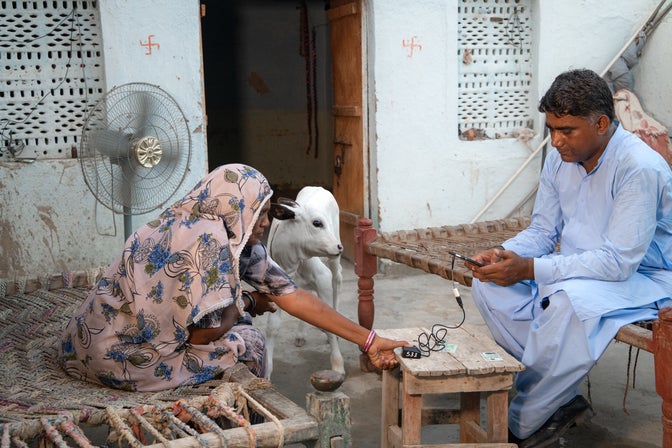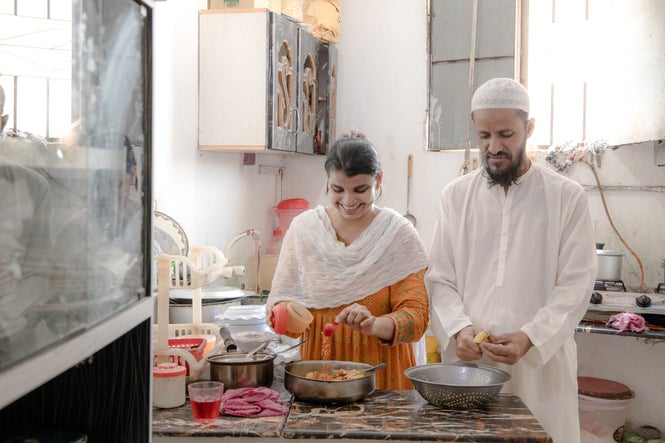 Sono Mal from Thar, beneficiary of the Pakistan Housing Finance Project, overseeing the construction of his new home
Sono Mal from Thar, beneficiary of the Pakistan Housing Finance Project, overseeing the construction of his new home
March 10th, 2022 marks an important milestone in the World Bank Group’s support to Pakistan in its land and housing sectors, with the approval of three complementary investments. This trilogy of projects, which provides support across the land and housing value chain – from the point when land is acquired for development to that when houses are purchased by beneficiaries - could improve access to affordable housing in Punjab and expand housing finance for low-income households across the country.
The housing gap in Punjab - Pakistan’s largest province - was estimated at 2.3 million units in 2017 and is expected to skyrocket to 11.3 million units by 2047.
Pakistan is facing a critical housing shortage. Population growth, migration from rural areas, and the deterioration of existing homes is driving the shortage in urban areas. The housing gap in Punjab - Pakistan’s largest province - was estimated at 2.3 million units in 2017 and is expected to skyrocket to 11.3 million units by 2047. A major problem is the quality of existing housing. Half of all urban households are overcrowded or live in informal settlements with inadequate access to basic infrastructure and services. Formal housing is out of reach for most of the population and mainly owned by men.
For housing markets to deliver formal housing that is affordable for all, both the supply and the demand sides must work well. The housing value chain is complicated by many weak links. On the supply side, fragmented and incomplete land records make it difficult for developers to buy land for housing development and for banks to underwrite mortgages. Other obstacles are related to getting planning and building permits, connecting homes to appropriate infrastructure, and accessing financing. On the demand side, the lack of affordable mortgages makes it hard to buy a house.
It is important for Pakistan to get housing right. Strong land and housing systems are critical to the country’s development trajectory.

Housing construction and real estate are important sectors whose performance has implications for the overall health of the economy.
Multi-faceted challenges of this scale require multi-sectoral solutions. The Bank’s interventions in Pakistan’s land and housing sectors will complement and support the government’s housing initiatives, including the flagship Naya Pakistan Housing Program, in addressing constraints on both the supply and the demand sides to deepen the housing market. The Bank will build on its previous housing sector engagements around the world – such as in Indonesia and Mexico – and deliver three new, complementary projects:
The first one, the Punjab Urban Land Systems Enhancement (PULSE) project, will support the digitization of land records, mapping property across the province. PULSE will create more secure land rights records for the public and help developers identify available land for the government-run housing programs.
The second, the Punjab Affordable Housing Program (PAHP), will help strengthen housing institutions and systems while increasing the quantity and quality of affordable housing supply. PAHP will finance the provision of basic infrastructure for housing, which will stimulate the supply of affordable housing by the private sector. PAHP will also support public sector construction of core housing units for the poorest and most vulnerable people. Beneficiaries of PAHP will be able to access loans subsidized under the Naya Pakistan Housing Program.
The third project is the Pakistan Housing Finance Project (PHFP), which was launched in 2018 and is being supplemented with Additional Financing. Additional Financing will support a significant scale-up of the project’s credit risk sharing facility to promote access to mortgage loans for low-income households, particularly informal workers, so that they can benefit from the government’s housing program.

An increasingly mature housing finance market will make housing finance affordable for more underserved Pakistanis and will deepen the financial markets.
It is important for Pakistan to get housing right. First, strong land and housing systems are critical to the country’s development trajectory. Improved housing quality and secure property rights are associated with human capital indicators, including less disease, better education outcomes, and lower fertility rates. Second, housing construction and real estate are important sectors whose performance has implications for the overall health of the economy. Third, an increasingly mature housing finance market will make housing finance affordable for more underserved Pakistanis and will deepen the financial markets. Finally, housing has an important impact on the way in which cities are formed as well as on resilience to climate change. Where houses are built, how they are planned, and how they are designed has an impact on greenhouse gas emissions and how vulnerable people are to disaster risks.
This trilogy of land and housing projects is therefore an important step forward that will have substantial economic, environmental, and social spillovers in Punjab and in Pakistan more broadly. It will begin to change the way in which cities allocate land and provide basic infrastructure for affordable housing, making them greener, more livable, more resilient, and more inclusive for all.




Join the Conversation